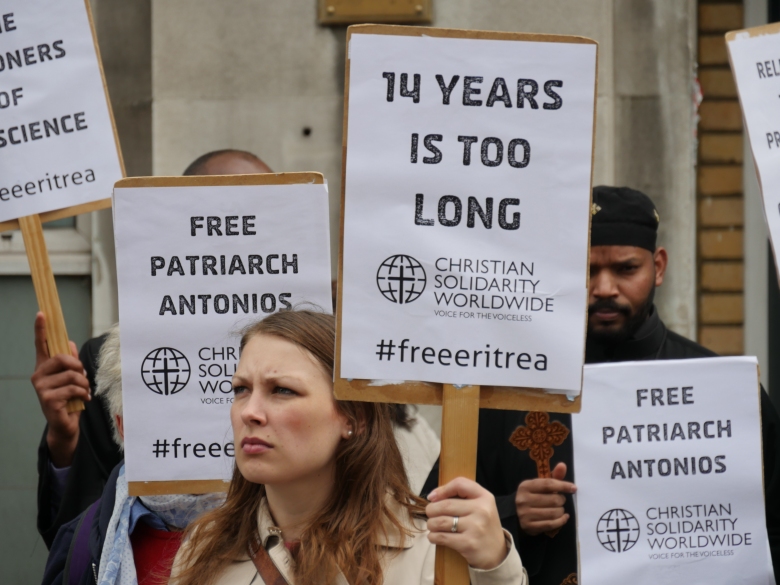Eritrea Protest Vigil 2017

Three years ago, I found myself at the United Nations Human Rights Council (HRC), playing a game with an eight year old girl – I would say the name of an animal and she would draw it. She was an Eritrean refugee and had come to the HRC with her parents as part of a delegation who were there to give testimony at a side event. Her entire family had been detained by the government, locked up with others in a shipping container. She shared memories of the entire place smelling awful, of being freezing cold at night and roasting hot during the day and of how she and her other siblings joked about which family member was covered with the most lice. A serious issue was turned into a game as their parents did their best to shield their children from the full force of the horrors they were experiencing.
In Eritrea prisoners are still confined in appalling conditions . In fact thousands of prisoners of conscience are currently detained arbitrarily and indefinitely in facilities where conditions are life threatening and torture is rife.
On 17 March 2017, two Pentecostal Christians reportedly died in hospital after undergoing a hunger strike to protest the abuse they suffered while detained at Wi’a military camp. The only means of resistance they had left was their own bodies. Following their deaths, military commanders are said to have confiscated their medical cards. Their tragic story is emblematic of many others, whose suffering and deaths generally fail to register internationally due to the closed nature and pervasive control of the ruling regime.
Not Isolated Cases
The Eritrean government is one of the most repressive in the world and its policies are responsible for around 5000 Eritreans fleeing their nation on a monthly basis. According to United Nations, an estimated 9% of the Eritrean population has fled in recent years. This number does not include those who died or disappeared en route.
In its June 2016 report, the United Nations Commission of Inquiry on human rights in Eritrea (COIE) found “reasonable grounds to believe” that crimes against humanity have been committed by state officials in a “widespread and systematic manner” since 1991, including the crimes of persecution against religious groups, and rape, repeated rape, and gang rape by detention officials.
Eritrea’s constitution technically protects freedom of religion or belief, as do regional and international legislation to which the nation is party. However, the ruling party has failed to respect this or any other human right. A campaign of arrests targeting selected religious communities has been ongoing since 2002, when the government effectively outlawed all practices not affiliated with the Catholic, Evangelical Lutheran or Orthodox Christian denominations and Sunni Islam. Other religious groups face insurmountable challenges in gaining registration and therefore recognition. If found practicing their faith, adherents of non-recognised groups are arrested and detained without charge or trial and can face torture or even death.
The campaign of arrests is unremitting, but due to pervasive government control, news trickles out slowly. Details are emerging of the arrests of a number of Christians in two locations that occurred during the week beginning 8 May 2017.
In one incident, six men and four women were reportedly rounded up following a raid on a prayer meeting in the north eastern town of Ghinda, and are held at the local police station, where they are said to lack food. During the same period, an unspecified number of Christians were picked up from their homes in Adi Quala in the southern part of the country in a round-up that is reported to still be ongoing.
In December 2016, a significant number of Christians were arrested in Asmara after they were found praying together and in August 2016, eight Christians were detained after gathering together in a park around 4 km away from Asmara, including a mother and her three year-old child.
Reports are only just emerging of the arrests in October 2016 of six men and women in Adi Segdo on the outskirts of Asmara, who were detained as they visited a sick person in his home and held for two months. Those detained included members of the person’s family. Another report highlights the arrests of 79 men, women and children, including a mother and baby, who were rounded up during a wedding ceremony in May 2016. They were initially incarcerated in Barentu and Agordat; however, over thirty are currently reported to be held at Mai Sirwa detention camp.
Moreover, despite being recognized, in many instances members of authorised groups also face repression. In the most highprofile example, the legitimate patriarch of the Eritrean Orthodox Church Abune Antonios was removed from office in violation of cannonical law and remains under incommunicado house arrest despite reports emanating from Eritrea during August 2016 that indicated his release was imminent.
Taking to the streets in solidarity
On 18 May, Christian Solidarity Worldwide will join Human Rights Concern Eritrea, Release Eritrea, the Medhanie Alem Eritrean Orthodox Church and the British Orthodox Church to protest the continuing repression of freedom of religion or belief in Eritrea.
The names of 27 Christians who are confirmed to have died at the hands of the regime since 2005, either while in prison or soon after incarceration, will be read out by campaigners and a letter will be delivered to the Ambassador calling for the release of all of Eritrea’s prisoners of conscience. The protest vigil marks the 15th anniversary of severe restrictions on Eritrea’s Christian community and the closure of churches affiliated to targeted denominations.
Follow @CSW_UK on Twitter and the hashtag #freeeritrea for photographs and updates during the protest vigil.
Event details:
Thursday 18 May, 3.30-4.30pm
Opposite the Eritrean Embassy,
96 White Lion St, London N1 9PF
Join us. Let the world know that you have not forgotten about Eritrea.
By Claire Denman, CSW’s Public Affairs Officer


![[AIM] Asmarino Independent Media](/images/logo/ailogo.png)